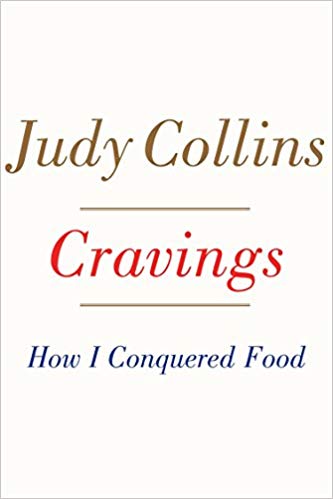Why does Judy Collins have twice the energy of pretty much everyone half her age?
The indefatigable, legendary folk singer will be performing a full tour schedule this year, frequently with the equally legendary Stephen Stills.
She’s got a new live recording coming out, a new single, and a new video, all available on the wide variety of internet resources that weren’t even a pipe dream when Collins started performing in the 1960s.
So how does she have the energy to keep going?
“I’m an athlete,” Collins says. “I’ve always exercised. Since my 20s, I’ve always had a big interest in physical fitness. I skied for 55 years. I run or get on a stationary bike or walk the airport with a very fast pace.
“I have a trampoline in my house and I jump up and down on it because I was told it’s the best treatment for osteoporosis, so I’m always on the move.”
And she eats right, as evidenced by her latest national bestseller, Cravings: How I Conquered Food just published in paperback by Anchor Books.
Collins describes herself as a recovering alcoholic and a recovering food addict, and is extremely active in 12 Step programs that help deal with both conditions.
“We ate exceptionally well in our home growing up,” Collins recalls. “We didn’t eat any white bread, white rice, or white flour. I think what you eat as a child goes into your health profile as you get older. And then by the age of 22, I was exercising every day. Eat right and move a lot, and you’ve got a shot.”
Collins wrote Cravings because she wanted to inspire others to get their eating straight.
“Singers influence people in society,” she says. “We influence them through our music, but then people are curious about our lives. So I wrote Cravings to explain to folks exactly what it means to have a food addiction. I like food! It’s just that not all food likes me. I’ve got no problem with 2,000 calories a day. It’s the 6,000 calories at night that were killing me!”
The central pillar of Collins’ physical and spiritual recovery is a membership in Alcoholics Anonymous and a 12 Step program related to food.
“The only thing I know that works for alcoholics is AA,” Collins says. “I get very agitated by the fact that Big Pharma and the American Medical Association are trying to figure out ways to get paid to treat alcoholism and drug addiction.
“First they cause a lot of addiction by creating medications and getting them into the hands of people who don’t need them, and then they want to get paid to solve the problem. To me, that’s insanity.
“I can’t say enough about Alcoholics Anonymous and GSA, which is the ‘GreySheet Approach’ to recover from overeating. This is how I’ve recovered, this is how I stay clean, and this is how I have the energy to keep on going. It’s awfully hard to even think about doing 130 shows if your body isn’t cooperating fully with you.”
Collins is concerned that if Big Pharma and the AMA are successful, their success could keep recovering alcoholics and addicts from getting the true benefits of recovery.
“AA is the greatest show in town!” Collins says. “The stories are amazing, but more than that, you’re connecting with other human beings, other addicts, on a deep level of honesty and trust. Even if you could get physical recovery from a pill Big Pharma sold you, you might have a lot of drug interactions with that, but you won’t have human interactions that will transform your life.
“Addicts don’t need to know simply not how to take their drug of choice, whether it’s alcohol, pills, sugar, white flour, or whatever else. They need to know how to live their lives in harmony with the world around them, how to be honest, how to take the best possible care of themselves.
“You don’t get that out of a prescription bottle.”
Collins’ performance schedule is back-loaded—most of her appearances in 2018 will take place between now and the end of the year. This means that you can catch one of the greatest singer/songwriters in American history at a concert… or, if you’re lucky, at a 12 Step meeting… near you.


